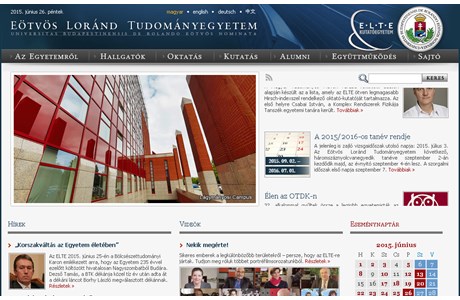Eötvös Loránd University
Eötvös Loránd University is the oldest and largest university in Hungary.
The history of Eötvös Loránd University (ELTE) can be traced back to 1635, when it was founded by Cardinal Péter Pázmány in Nagyszombat, Hungary. The university was originally a Catholic institution, but it was secularized in the 18th century.
In 1777, the university was moved to Budapest, where it has remained ever since. ELTE quickly became one of the leading universities in Hungary, and it has produced many notable alumni, including Nobel laureates, politicians, and scientists.
The university was closed during World War I and World War II, but it reopened after each war. In the aftermath of World War II, ELTE became a center for intellectual and political resistance against the communist regime.
After the fall of communism in 1989, ELTE underwent a series of reforms. The university expanded its curriculum, increased its research funding, and strengthened its ties to international universities.
ELTE is committed to internationalization. The university offers a variety of English-taught degree programs, and it has partnerships with universities all over the world. ELTE is also a member of the European University Association and the International Association of Universities.
ELTE has played a significant role in the development of Hungary. The university has produced many of the country's leading thinkers and leaders, and it continues to be a center for academic excellence, research, and internationalization.
Based on the QS World University Rankings of 2025, Eötvös Loránd University is positioned as the #564 top university in the world, which makes it the #1 top university in Hungary.
University Profile
Get a quick snapshot of the university's key details.
| 2025 Ranking | #1 |
|---|---|
| University Name | Eötvös Loránd University |
| Name in Local Language | Eötvös Loránd Tudományegyetem |
| Acronym | ELTE |
| Year Established | 1635 |
| Motto | A tudás közössége |
| Motto in English | Science Community |
Location
The university is located in Budapest. Find the address and map of the university below.
| Address | Egyetem tér 1-3., Budapest, Hungary |
|---|---|
Contact
Connect with the university easily! Find their contact details.
| Phone | +36 (1) 2664140 |
|---|---|
| Fax | +36 (1) 411 6538 |
| Website |

|
| Click here to send email | |
| More Links |
Admission Info
Find information below on admission to Eötvös Loránd University.
| Accepts International Students | Yes |
|---|---|
| Student Body | Men and Women |
Scholarship and Financial Aids
There is no information found on scholarships or financial aids offered by Eötvös Loránd University. You may like to visit their website for more details.
Programs and Courses
Get a quick overview of programs and courses offered at this university.
| Bachelor's Degrees | Master's Degrees | Doctorate Degrees | Diplomas | |
|---|---|---|---|---|
| Arts & Humanities | n/a | |||
| Business & Social Sciences | n/a | n/a | n/a | |
| Engineering | n/a | n/a | n/a | n/a |
| Language & Cultural Studies | n/a | |||
| Medicine & Health | n/a | n/a | n/a | n/a |
| Science & Technology | n/a |
Click on the following button to explore a detailed list of programs and courses of this institute.
View Course ListRanking History
The following chart shows how the ranking of this university in Hungary has changed over the last 5 years.
